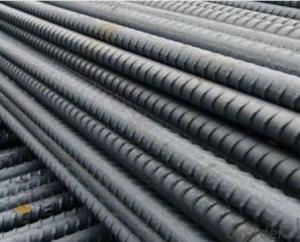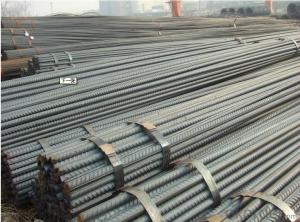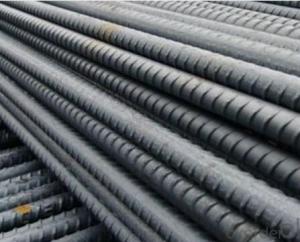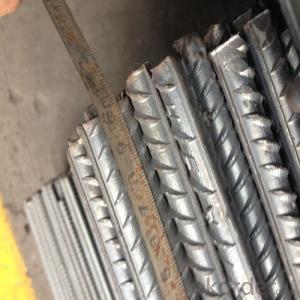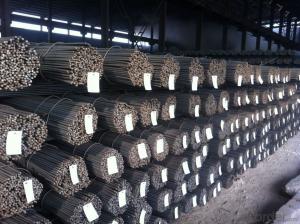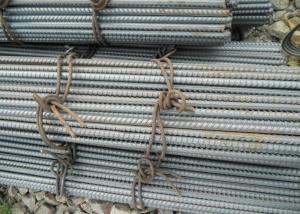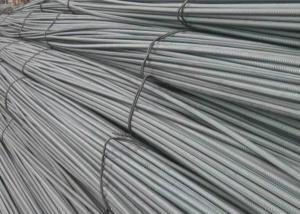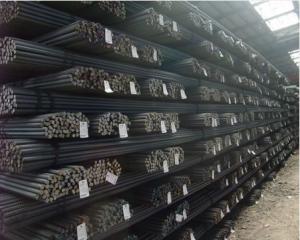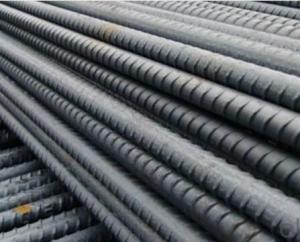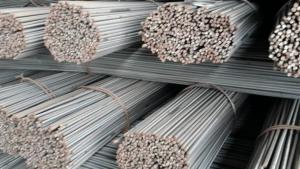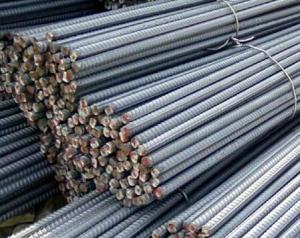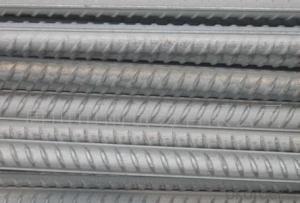Hot Rolled Steel Rebars EN Standard in High Quality
- Loading Port:
- Tianjin
- Payment Terms:
- TT or LC
- Min Order Qty:
- 100 m.t.
- Supply Capability:
- 10000 m.t./month
OKorder Service Pledge
OKorder Financial Service
You Might Also Like
OKorder is offering Hot Rolled Steel Rebars EN Standard in High Quality at great prices with worldwide shipping. Our supplier is a world-class manufacturer of steel, with our products utilized the world over. OKorder annually supplies products to African, South American and Asian markets. We provide quotations within 24 hours of receiving an inquiry and guarantee competitive prices.
Product Applications:
Hot Rolled Steel Rebars EN Standard in High Quality are ideal for structural applications and are widely used in buildings, bridges, roads and other engineering construction. Big to highways, railways, bridges, culverts, tunnels, public facilities such as flood control, dam, small to housing construction, beam, column, wall and the foundation of the plate, deformed bar is an integral structure material..
Product Advantages:
OKorder's Hot Rolled Steel Rebars EN Standard in High Quality are durable, strong, and wide variety of sizes.
Main Product Features:
· Premium quality
· Prompt delivery & seaworthy packing (30 days after receiving deposit)
· Can be recycled and reused
· Mill test certification
· Professional Service
· Competitive pricing
Product Specifications:
Standard | GB UK USA | HRB335 HRB400 HRB500 G460B, B500A, B500B,B500C GR40, GR60 | |
Diameter | 6mm,8mm,10mm,12mm,14mm,16mm,18mm,20mm, 22mm,25mm,28mm,32mm,36mm,40mm,50mm | ||
Length | 6M, 9M,12M or as required | ||
Invoicing | Actual or Theoretical Weight Basis as buyer’s request. | ||
Type | Hot rolled steel rebar | ||
FAQ:
Q1: Why buy Materials & Equipment from OKorder.com?
A1: All products offered byOKorder.com are carefully selected from China's most reliable manufacturing enterprises. Through its ISO certifications, OKorder.com adheres to the highest standards and a commitment to supply chain safety and customer satisfaction.
Q2: How do we guarantee the quality of our products?
A2: We have established an advanced quality management system which conducts strict quality tests at every step, from raw materials to the final product. At the same time, we provide extensive follow-up service assurances as required.
Q3: How soon can we receive the product after purchase?
A3: Within three days of placing an order, we will arrange production. The normal sizes with the normal grade can be produced within one month. The specific shipping date is dependent upon international and government factors, the delivery to international main port about 45-60days.
Images:
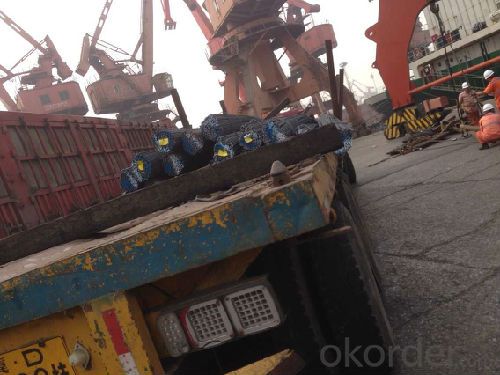
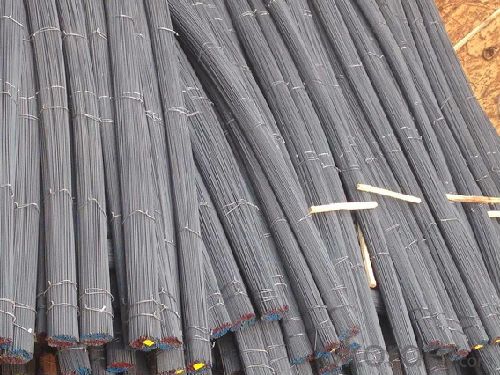
- Q:Are steel rebars suitable for use in structures with high resistance to impact?
- Yes, steel rebars are suitable for use in structures with high resistance to impact. Steel rebars are known for their high strength and durability, making them a reliable choice for reinforcing structures that need to withstand impact forces. Their ability to absorb and distribute impact loads helps enhance the structural integrity and resilience of the building, making them a preferred material in construction projects where impact resistance is crucial.
- Q:How are steel rebars used in the construction of oil and gas refineries?
- The strength and durability of steel rebars make them widely used in the construction of oil and gas refineries. These rebars, made from high-strength steel, reinforce concrete structures and increase their load-bearing capacity. In the construction of oil and gas refineries, steel rebars are primarily utilized in various reinforced concrete structures like foundations, columns, beams, slabs, and walls. These structures are crucial for supporting heavy equipment, storage tanks, processing units, and other essential refinery components. During construction, rebars are embedded in the concrete, forming a reinforced framework that can withstand high loads, seismic activity, and extreme weather conditions. The steel reinforcement enhances the concrete's tensile strength, making it more resistant to cracks and structural failure. Furthermore, the use of rebars ensures the long-lasting nature of refinery infrastructure. Oil and gas refineries operate in harsh environments with exposure to chemicals, high temperatures, and corrosive agents. Steel rebars possess excellent corrosion resistance, which is vital for maintaining the structural integrity of the refinery. Moreover, rebars facilitate the construction of complex shapes and configurations required in refinery structures. They can be bent, cut, and molded to fit specific design requirements, enabling the creation of intricate concrete structures essential for the refinery's functionality. Overall, steel rebars play a vital role in oil and gas refinery construction, providing necessary reinforcement to concrete structures. Their strength, durability, and corrosion resistance make them ideal for enduring the demanding conditions in these facilities, ensuring the safety and longevity of the refinery infrastructure.
- Q:Why is the price of screw steel affected by iron ore and coal?
- Just now the manufacturing needs to consume iron ore and gas energy, the cost goes up, the price certainly changes
- Q:What is the average weight of steel rebars per meter?
- The average weight of steel rebars per meter can vary depending on the diameter and type of rebar used. However, on average, a standard 1-meter length of steel rebar weighs around 2.5 to 3 kilograms.
- Q:How do steel rebars affect the overall flexibility of a structure?
- Steel rebars greatly enhance the overall flexibility of a structure. By reinforcing the concrete, rebars provide additional tensile strength, allowing the structure to better withstand external forces such as wind, earthquakes, or heavy loads. This added flexibility prevents cracking and structural failure, ensuring the longevity and safety of the building.
- Q:What is the difference between steel rebars and FRP rebars?
- Steel rebars are traditional reinforcement bars made of steel, while FRP rebars are reinforced polymer bars. The main difference lies in their composition and properties. Steel rebars are strong and durable, but they are prone to corrosion, requiring regular maintenance. On the other hand, FRP rebars are corrosion-resistant, lightweight, and possess high tensile strength. They also offer better thermal and electrical insulation. However, FRP rebars are relatively new in the construction industry and may be more expensive compared to steel rebars.
- Q:Are steel rebars susceptible to fatigue failure?
- Yes, steel rebars are susceptible to fatigue failure.
- Q:How do steel rebars improve the strength and durability of concrete?
- Steel rebars improve the strength and durability of concrete in several ways. Firstly, rebars provide reinforcement to the concrete structure, increasing its tensile strength. Concrete is excellent at withstanding compression forces, but it is relatively weak when it comes to tension. By embedding steel rebars within the concrete, the tensile strength of the structure is significantly enhanced. This means that the concrete can resist bending, cracking, and collapsing under heavy loads or external forces. Secondly, steel rebars prevent cracking and shrinkage in the concrete. Concrete tends to shrink as it dries and cures, leading to the development of cracks. However, rebars help to control and restrict this shrinkage by providing additional support and structural integrity. This helps to minimize the occurrence of cracks and ensures that the concrete remains strong and durable over time. Furthermore, steel rebars improve the overall structural stability of the concrete. When concrete is subjected to dynamic loads or seismic activity, it can experience significant deformation or even failure. The presence of rebars helps to distribute the load more evenly throughout the concrete structure, reducing the risk of localized damage or collapse. This enhances the overall stability and safety of the concrete construction. Lastly, steel rebars increase the longevity and durability of concrete structures. The steel used in rebars is highly resistant to corrosion, which is a common issue in concrete exposed to harsh environmental conditions or moisture. By providing a protective layer around the steel, known as passivation, rebars prevent corrosion and maintain the structural integrity of the concrete for an extended period. This ensures that the concrete remains strong, durable, and resistant to degradation over its lifespan. In summary, steel rebars play a crucial role in improving the strength and durability of concrete. They enhance the tensile strength, prevent cracking and shrinkage, enhance structural stability, and increase the longevity of the concrete structure. With the addition of steel rebars, concrete becomes a reliable and long-lasting construction material capable of withstanding various loads and environmental conditions.
- Q:What is the role of steel rebars in multi-story building construction?
- The role of steel rebars in multi-story building construction is to provide reinforcement and strength to concrete structures. Rebars are embedded within the concrete to absorb tensile forces and prevent cracking or structural failure. They enhance the structural integrity and durability of the building, enabling it to withstand various external and internal forces such as earthquakes, wind loads, and heavy loads.
- Q:Can steel rebars be used in high-strength concrete?
- Indeed, steel rebars have the capability of being utilized in high-strength concrete. In reality, steel rebars are commonly employed to reinforce concrete structures, regardless of the concrete's strength. High-strength concrete pertains to a type of concrete that possesses a significantly higher compressive strength when compared to conventional concrete. Its compressive strength typically exceeds 6,000 psi (pounds per square inch). The presence of steel rebars in high-strength concrete is essential as they provide the necessary tensile strength. Although concrete exhibits commendable compressive strength, its tensile strength is relatively feeble. By incorporating steel rebars into the concrete, the composite material becomes more robust and durable. The rebars act as reinforcement, effectively resisting the tensile forces and averting cracks or structural failure. Nevertheless, it is crucial to emphasize the importance of selecting the appropriate steel rebar for high-strength concrete. The rebars employed must possess adequate strength and ductility to endure the elevated stresses and strains associated with high-strength concrete. Moreover, proper placement, spacing, and anchorage of the rebars are vital to ensure effective reinforcement and optimal performance of the concrete structure. In summary, it is undeniable that steel rebars can certainly be utilized in high-strength concrete to augment its tensile strength and overall structural integrity.
1. Manufacturer Overview |
|
|---|---|
| Location | |
| Year Established | |
| Annual Output Value | |
| Main Markets | |
| Company Certifications | |
2. Manufacturer Certificates |
|
|---|---|
| a) Certification Name | |
| Range | |
| Reference | |
| Validity Period | |
3. Manufacturer Capability |
|
|---|---|
| a)Trade Capacity | |
| Nearest Port | |
| Export Percentage | |
| No.of Employees in Trade Department | |
| Language Spoken: | |
| b)Factory Information | |
| Factory Size: | |
| No. of Production Lines | |
| Contract Manufacturing | |
| Product Price Range | |
Send your message to us
Hot Rolled Steel Rebars EN Standard in High Quality
- Loading Port:
- Tianjin
- Payment Terms:
- TT or LC
- Min Order Qty:
- 100 m.t.
- Supply Capability:
- 10000 m.t./month
OKorder Service Pledge
OKorder Financial Service
Similar products
New products
Hot products
Related keywords
